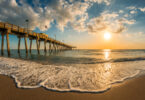Despite how it may seem in the movies or on TV, travelers are very rarely forced to cope with natural disasters while on vacation. The fact that most destinations’ travel seasons are when weather and terrain are usually in harmony, and the rarity of nature’s mega surprises, means that your trip will likely be free of any sort of natural catastrophe. But snagging deals on last minute flights and luxurious hotels don’t make you immune to Mother Nature’s whims.
A lack of preparation can make the chaos that develops when your travel plans collide head-on with a tropical storm even worse. Not knowing how to keep your friends or family safe when tornados are in the vicinity will turn an already scary experience into one that’s more terrifying. Not knowing how to react if the ground begins to tremble from an earthquake can lead to some dangerous decisions.
Here’s some advice on what you can do to be ready if your vacation is hit by a natural disaster.
Looking for cheap last minute flights? Check out these super low fares that can save your day!
Prepare for the Worst While Planning Your Trip

The key to getting through a disaster? Don’t wait until it happens to have a plan.
As you put together every trip, you should work to find out if your destination is prone to natural disasters. The State Department has an excellent resource on what you need to know about tropical storms before you travel. The US Geological Survey’s Earthquake Facts & Earthquake Fantasy is great if you’re clueless about earthquakes. And while a lot of volcanoes are dormant, you might want check to make sure you’re not too near one of the 12 volcanoes around the world that could erupt at any time.
Once you’ve figured out what natural disaster is most likely to hit your destination, you can look up what you need to know to handle the situation. The Red Cross has series of free apps that you can download for free to your smartphone or tablet and use as a resource for almost every conceivable disaster.
Itineraries that include high-risk places will probably need further scrutiny and you might even want to think about mapping out evacuation routes and locating potential shelters in case something happens.
Depending on the cost of the trip, the location, and the perceived risk, you might also want to look into comprehensive travel insurance that includes coverage for natural disasters, as well as signing up for traveler assistance services that are available 24/7 to help you if you need them.
Americans traveling outside the United States should enroll in the Smart Travel Enrollment Program (STEP). The local US Embassy will contact STEP participants when there is a natural disaster, civil unrest, or a family emergency.
[perfectpullquote align=”full” cite=”” link=”” color=”” class=”” size=””]No matter where you’re going, always put a kit that includes copies of travel documents, passports and visas, written medical prescriptions, an extra supply of daily medications, first aid items, and emergency contact info.[/perfectpullquote]
Put Together an Emergency Plan After You Land

Once you get to your destination, you still have a few more steps of preparation before you can enjoy your vacation.
If you hadn’t already, now’s the best time to take a few minutes and figure out the phone numbers for the local emergency services, as well the nearest embassy, and put them into your phone (if you don’t have service, go low-tech and write them down on a piece of paper to keep in your wallet). It also wouldn’t hurt to send your exact location (the hotel address and room number) to a friend or family member back home so they can direct anyone to help find you in the worst case scenario.
If you’re traveling in a group, it’s important to pick a prearranged meeting spot in case you get lost during a catastrophic event. Be sure any children you’re traveling with know where to go and have the phone numbers to call if they get separated from their parents.
Be Ready to Respond to a Natural Disaster

When power lines are down and water isn’t safe to drink, it may be difficult, but the best thing you can do is remain calm. Overreacting in such a chaotic environment will only make things worse.
Instead of panicking or frantically looking for last minute flights out of your location (virtually impossible in the case of a natural disaster), your energies should be rechanneled to focus on the immediate surroundings. The first step is to find safe shelter. The place to head during a tsunami will be different from where you need to go during an earthquake. Look to local authorities for lodging, food, and travel advice. Hunger may set in, but pickiness in food choices should prevail. Within no time, there will be a limited amount of safe food and water, so be mindful of what you consume.
Continue to monitor the bulletins and advisories issued by local authorities via local radio, television, or social media. If you’re able to, try to leave the area as soon as possible. Government agencies will arrange the evacuation process.
Finally, once the immediate danger has passed, remember to contact family and friends to let them know everything is okay.
Have you ever had to deal with a natural disaster while on vacation? Tell us about it in the comments section below!








